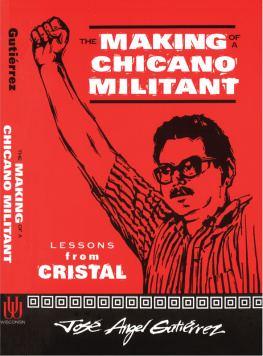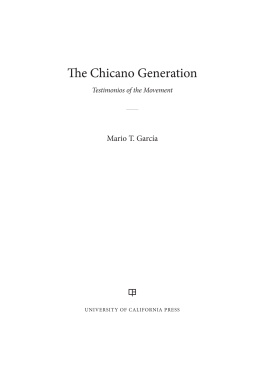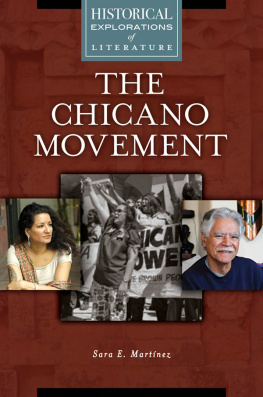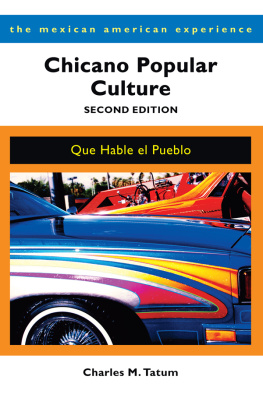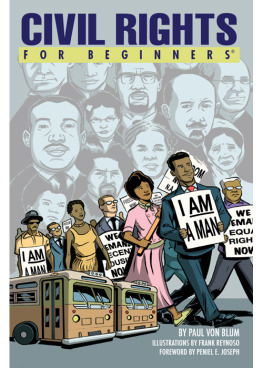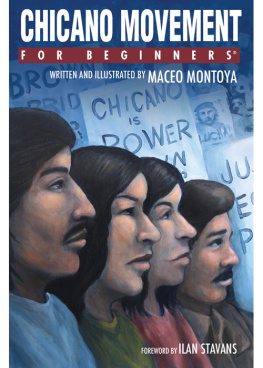
Rethinking the Chicano Movement
In the 1960s and 1970s, an energetic new social movement emerged among Mexican Americans. Fighting for civil rights and celebrating a distinct ethnic identity, the Chicano Movement had a lasting impact on the United States, from desegregation to bilingual education.
Rethinking the Chicano Movement provides an astute and accessible introduction to this vital grassroots movement. Bringing together different fields of research, this comprehensive yet concise narrative considers the Chicano Movement as a national, not just regional, phenomenon, and places it alongside the other important social movements of the era. Rodriguez details the many different facets of the Chicano movement, including college campuses, third-party politics, media, and art, and traces the development and impact of one of the most important post-WWII social movements in the United States.
Marc Simon Rodriguez is Associate Professor of History at Portland State University and the managing editor of the Pacific Historical Review.
American Social and Political Movements of the Twentieth Century
Series Editor: Heather Ann Thompson, University of Michigan
Rethinking the American Anti-War Movement
By Simon Hall
Rethinking the Asian American Movement
By Daryl J. Maeda
Rethinking the Welfare Rights Movement
By Premilla Nadasen
Rethinking the Gay and Lesbian Movement
By Marc Stein
Rethinking American Womens Activism
By Annelise Orleck
Rethinking the Chicano Movement
By Marc Simon Rodriguez
First published 2015
by Routledge
711 Third Avenue, New York, NY 10017
And by Routledge
2 Park Square, Milton Park, Abingdon, Oxon OX14 4RN
Routledge is an imprint of the Taylor & Francis Group, an informa business
2015 Taylor & Francis
The right of Marc Simon Rodriguez to be identified as author of this work has been asserted by him in accordance with sections 77 and 78 of the Copyright, Designs and Patents Act 1988.
All rights reserved. No part of this book may be reprinted or reproduced or utilised in any form or by any electronic, mechanical, or other means, now known or hereafter invented, including photocopying and recording, or in any information storage or retrieval system, without permission in writing from the publishers.
Trademark notice: Product or corporate names may be trademarks or registered trademarks, and are used only for identification and explanation without intent to infringe.
Library of Congress Cataloging-in-Publication Data
Rodriguez, Marc S., 1968
Rethinking the Chicano movement / Marc Simon Rodriguez.
pages cm.(American social and political movements of the
twentieth century)
Includes bibliographical references and index.
1. Chicano movementHistory. 2. Mexican AmericansPolitics and
government. 3. Mexican AmericansSocial conditions. I. Title.
E184.M5R5875 2014
973.046872dc232014022362
ISBN: 978-0-415-87741-1 (hbk)
ISBN: 978-0-415-87742-8 (pbk)
ISBN: 978-0-203-08172-3 (ebk)
Typeset in Bembo
by Apex CoVantage, LLC
Contents
Welcome to the American Social and Political Movements of the 20th Century series at Routledge. This collection of works by top historians from around the nation and world introduces students to the myriad movements that came together in the United States during the 20 th century to expand democracy, to reshape the political economy, and to increase social justice.
Each book in this series explores a particular movements origins, its central goals, its leading as well as grassroots figures, its actions as well as ideas, and its most important accomplishments as well as serious missteps.
With this series of concise yet synthetic overviews and reassessments, students not only will gain a richer understanding of the many human rights and civil liberties that they take for granted today, but they will also newly appreciate how recent, how deeply contested, and thus how inherently fragile, are these same elements of American citizenship.
Heather Ann Thompson
Temple University
From the dusty border towns of Texas to the busy streets of Chicago and Los Angeles, the impact of the Chicano Movement is still felt in the daily lives of all Americans. The Mexican American civil rights movement, which flourished in the 1960s and 1970s, pushed the boundaries of US citizenship, provided the impetus for modern bilingual education, and continues to expand the historical understanding of what it means to be a long-standing racial minority in the United States. This social movement, with aims comparable to those of the African American civil rights movement, sought to end generations of formal and informal discrimination against Americans of Mexican ancestry and to remedy past discrimination by creating support for educational, social, and employment opportunities for Mexican Americans. Comprised of many regionally based movements, the Chicano Movement had several important loci of activism, rather than a central leadership. In some ways parallel to the Black Power Movement, it built upon an established tradition of Mexican American civil rights activism, even as it saw itself as a radical and youth-driven movement dedicated to the creation and celebration of a distinctly Chicano culture and politics.
The Mexican American, or Chicano, community has not always been generally recognized as a historically significant presence in the United States, and the Chicano civil rights movement, in particular, is comparatively little known. Informed people are aware that Mexican Americans (or Spanish Americans or Latins) have populated the US Southwest as a distinct regional minority group for generations, and some would also locate Chicanos alongside Native Americans and Asian Americans as one of the smaller minority groups with a long history in the United States. However, these lesser minority groups often remain outside the US historical imaginary. The typical worldview among both everyday people and scholars has created a black/white binary of understanding when it comes to race and history in the United States. For example, most Americans have heard of the landmark 1954 Brown v. Board of Education case, but how many know about Hernandez v. Texas decided that same year? The Chicano Movement altered common understandings of the history of racial and ethnic discrimination and introduced language rights into the national civil rights debate.
The American Social and Political Movements of the Twentieth Century series is itself an effort to expand common understandings of the variety of twentieth-century social movements; in this spirit, the current book is an effort to rethink the Chicano Movement and place it alongside the important social movements of the era.
Who are the Chicanos?
Terminology
Perhaps the confusing terminology employed by the government, the media, and community groups to label the Hispanic community is one of the reasons that many Americans know so little about the Chicano Movement. Today one might refer to members of Spanish-speaking or Latin American-origin communities as Hispanics or Latinos, yet these terms are too broad to convey any meaningful content. Hispanic refers both to an expansive group including long-term domestic minorities, such as Mexican Americans and Puerto Ricans, with long histories of domestic discrimination, and to immigrants from Spain, refugees from Cuba, and the growing number of immigrants from the Caribbean and Latin America. Interior to this confusing definitional terrain, many Latinos and recent immigrants themselves know very little about the Chicano Movement.


